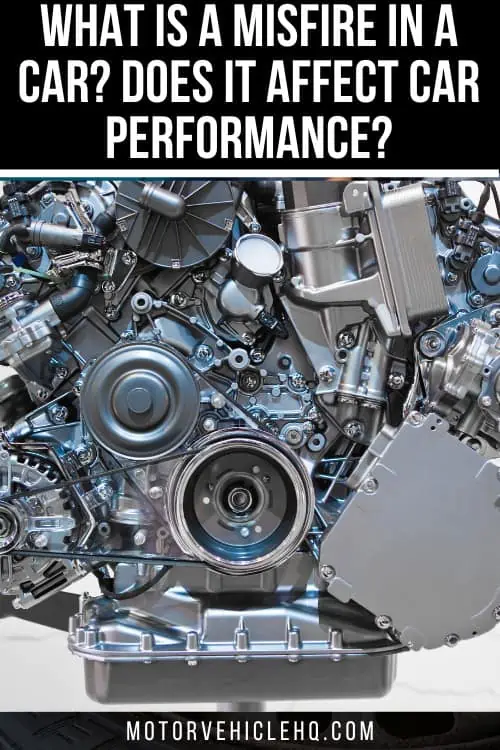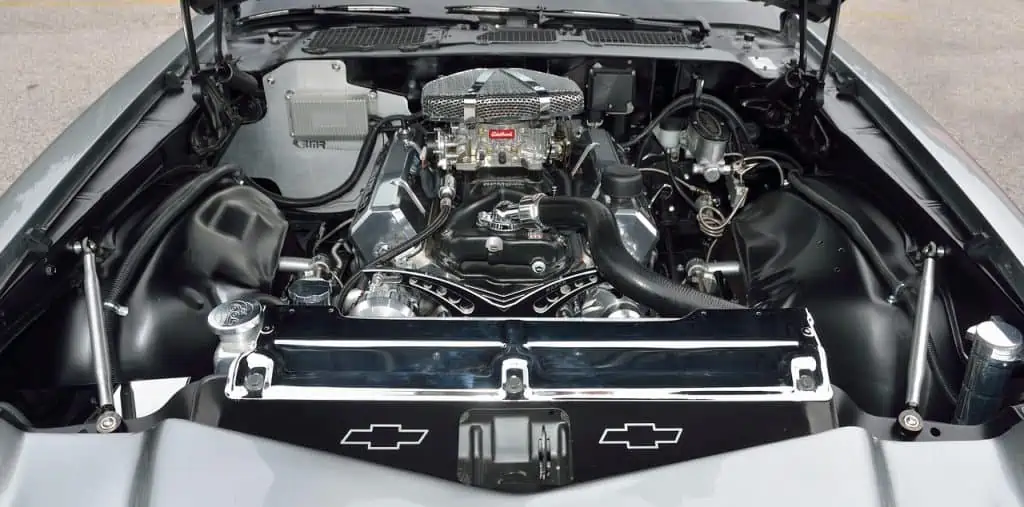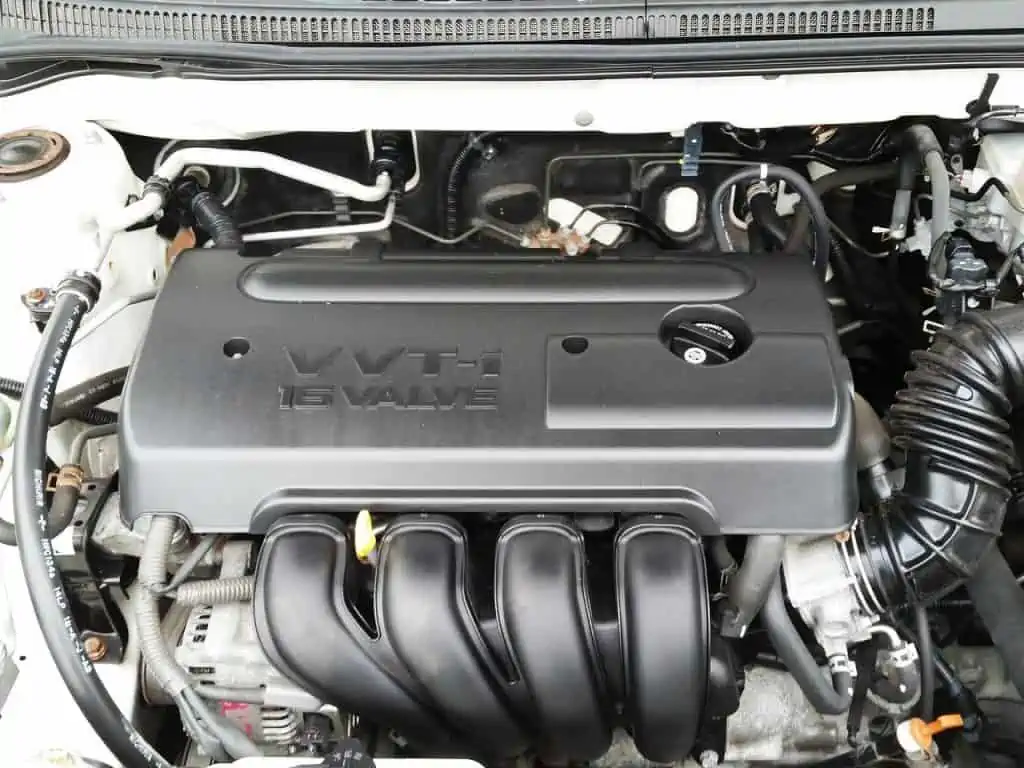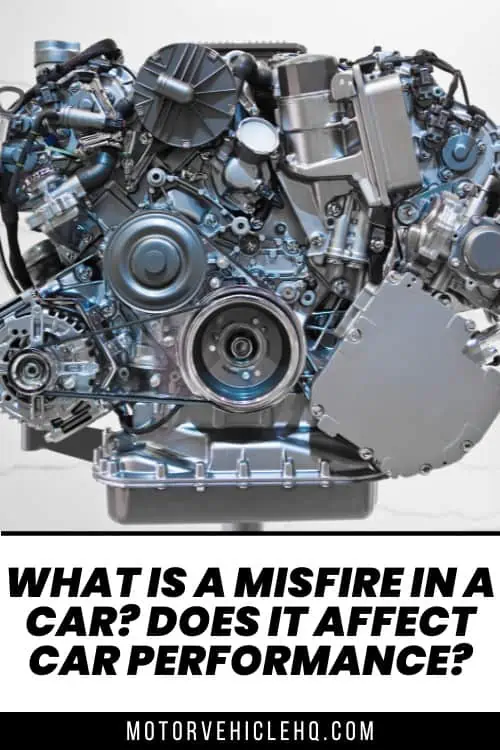In terms of mechanics, a misfire is the outcome of zero or incomplete combustion inside one or more of an engine’s cylinders. However, as the driver, you will typically experience hesitancy or trembling when the issue arises. When there is a misfire in a contemporary car, the check engine light will also come on.
Your car’s main computer, also known as the powertrain control module (PCM), will record a diagnostic problem code (DTC) in its memory when the check engine light comes on. The key DTCs connected with an engine misfire are P0300 through P0312.
Although determining the cause of an engine misfire might be challenging, the context offers important hints. Misfires are frequently sporadic and sporadically limited to a certain fuel, setting, or engine load (how far down the gas pedal you are).
Usually, a misfire in one cylinder won’t stop the automobile from operating since the remaining cylinders will keep it moving. But it won’t operate regularly or without repercussions.
Engine misfire symptoms shouldn’t be disregarded since they might cause long-term harm to the engine. Due to the engine having to work harder to make up for the slacker cylinder, the car will also have less fuel economy and higher emissions (s).
What Does “Engine Misfire” Mean?
To burn fuel and produce power, a healthy four-stroke combustion engine carries out a set of tasks in the proper sequence and moment.
The intake valves open as the piston descends, allowing a precise air-fuel combination to enter the combustion chamber. This combination is pressurized when the piston rises after the valves close.
This air-fuel combination is ignited by the spark plug during the power stroke, further raising cylinder pressure. The piston is swiftly forced down by this great pressure, which causes the crankshaft to rotate.
On the exhaust stroke, the exhaust valves open, releasing the cylinder’s burned gases, and the cycle is then repeated.
Misfires can be brought on by issues with one or more of the elements required for combustion (fuel, oxygen, and a spark), as well as mechanical elements like the cylinder itself.
An engine will misfire if the timing is off or if one or more cylinders don’t finish the process. The combination may not ignite at all or may detonate too soon if the air-fuel ratio is off (colloquially referred to as engine knock).
Internal combustion engines by Huhu Uet / CC BY-SA 3.0
What are the Symptoms of a Car Engine Misfires?
Similar to many other auto problems, engine misfires can present with similar symptoms. Checking the vehicle’s computer for codes is the first step in the diagnosis process.
You should be on the lookout for a misfire if you see any or all of these symptoms.
1. Unsteady Acceleration
You can experience a small or powerful shock from the engine when a misfire happens.
These misfires do frequently occur when the engine is under strain, such as when you are driving quickly. Misfires are most frequently observed while in high gears, low RPM, and with the accelerator down. A common indication that your engine is misfiring is jerky acceleration.
2. A Rusty Idle
On occasion, the engine can misfire while it is idle as well; your engine sensors will receive incorrect readings, and the air-fuel mixture will be off. This may result in a very unsteady idle that jumps up and down, and the engine may even cut off while idle.
This is likely one of the first places you notice misfires because the car engine is most susceptible to minor air-fuel mixture issues when it is idling.
3. Car Rumbles
When an automobile engine is produced, it is carefully balanced and frequently uses balance axles and other techniques to produce as little vibration as possible.
The engine will fall out of balance when one or more cylinders are not firing properly, and this might result in severe vibrations within your cabin during acceleration or at idling.
4. The Check Engine Light Comes On
All the many engine sensors in modern automobiles are very well monitored. The information will be sent to the engine control unit if one sensor malfunctions or detects that something is not quite right with the engine.
The engine control unit will determine if the issue is severe or not after receiving the data. The engine control unit will turn on the check engine light to let you know anything is wrong if the issue recurs frequently so you can have it fixed.
The engine light frequently illuminates and a fault code is frequently stored on the cylinder where the engine misfires when the ECU detects misfires. Utilize a diagnostic scanner to check the error codes.
There are several potential causes for the check engine light, so it’s crucial to get the code analyzed to determine just what went wrong. Diagnostic error codes P0301 through P0312 frequently appear. The misfire cylinder is identified by the final two digits. P0306, for instance, might indicate a problem with cylinder 6 misfires.
Another code that might show if numerous cylinders are misfiring is P0300.
A Mercedes-Benz V6 internal combustion engine by Till.niermann / CC BY-SA 3.0
Similar error codes include:
- Code P0300
- Code P0301
- Code P0302
- Code P0303
- Code P0304
- Code P0305
- Code P0306
5. Sluggish Acceleration
Misfires can result in the O2 sensors receiving inaccurate data, as we previously described, and producing a mixture that is either too rich or too thin.
Overly lean or rich mixes will reduce acceleration and possibly put your car into limp mode, which will prevent it from revving over 3500 rpm and turn off the turbocharger’s boost pressure.
6. An Abnormal Sound of the Engine
You may have heard the difference in sound between various engines if you have even a passing familiarity with automobiles. A four-cylinder engine’s tone is substantially different from a V8 engine’s tone.
Your 4-cylinder engine could sound like a 3-cylinder engine if one cylinder is misfiring in it. If the sound coming from your automobile is unusual, there are probably misfires on every cycle that you can hear.
7. Significant Exhaust Smoke
There is a problem when the exhaust is highly white, blue-tinged, black, or smells sweet. An excessively rich air-fuel combination or carbon buildup may be the cause of dark, sooty exhaust. Oil burning is indicated by the blue-tinged exhaust.
An exhaust that is white and smells sweet might indicate a head gasket problem. The capacity of the engine to burn the mixture as designed will be hampered by anything in the combustion chamber that is neither air nor gasoline.
What are the Most Frequent Reasons for Engine Misfire In Cars?
Let’s assume your automobile suffers from an engine misfire. The issue’s cause is being questioned. Unfortunately, there are several possible explanations, therefore it’s not always simple to provide a solution. It’s preferable to let an expert diagnose the cause of a misfire if your automobile is experiencing one.
When determining the problem, a mechanic could discover the following:
1. Issues with the Ignition System
Most people imagine worn-out spark plugs when they hear the word “misfire.” They are unaware that the ignition system’s spark plugs are only one component.
The control module, crankshaft position sensor, coil packs, wiring, and, of course, spark plugs are all parts of a typical contemporary ignition system. An engine misfire might happen if any of these components are having problems.
Vehicle auto Ferrari Ferrari F355 engine
2. Issues with Fuel and Air Delivery
Inside the engine, the combination of air and gasoline is ignited by the spark plug. The engine is set in motion by the explosion, producing the rotational power required to move your automobile forward.
A misfire can be brought on by any problem that alters the air/fuel combination, from a broken fuel injector to a vacuum leak.
3. Issues with Emissions Equipment
Modern vehicles come equipped with a variety of emissions controls that assist reduce the number of pollutants emitted into the atmosphere.
The positive crankcase ventilation (PCV) system and the exhaust gas recirculation (EGR) system are two examples. In rare circumstances, problems with emissions equipment might change the engine’s air/fuel ratio to the point where a misfire results.
4. Mechanical Issues with the Engine
Additionally, a lot of individuals are unaware that an engine mechanical issue might result in a misfire. To ensure full combustion, the air/fuel combination must be compressed within each of the engine’s cylinders.
To generate sufficient compression, the cylinder must stay entirely shut off while the piston is traveling upward. Internal engine issues might make it difficult for the cylinder to properly seal, which results in a loss of compression and an engine misfire.
5. Issues with Sensors and Modules
The PCM employs a large number of the sensors used in modern automobiles to manage important processes like fuel supply and spark timing. As a result, sensor issues can easily cause an engine to misfire. Despite being quite uncommon, a misfire can also be brought on by a fault with the PCM.
6. The Trouble with the Control Circuit
Electrical circuits are used to connect all of the input and output engine management components (such as sensors, ignition coil packs, etc.) when necessary. An engine may misfire as a result of issues with these circuits, such as frayed wire or a loose connection.
When Do You Expect the Engine to Misfire?
The following circumstances can cause the engine to misfire:
There Can Be an Engine Misfire During Acceleration
It’s not just terrible for the engine when an engine misfires when the throttle is down; it may also be extremely unsafe for everyone on the road.
Misfires can occur when a vehicle is accelerating while under load. As a result, your car may accelerate slowly or sluggishly and have problems picking up speed. When you depress the throttle, you can experience a jerking action.
Spark plug wear is the most frequent reason for an engine to misfire when accelerating. Excessive wear on spark plugs prevents them from igniting the gasoline in the piston cylinder as they should.
Additionally, clogged spark plugs, a broken distributor cap, or defective spark plug wires may be to blame for this. All of these issues have the same solution: to stop the coil voltage from jumping the spark plug gap, which would otherwise result in an engine misfire as the car accelerates.
Vehicle Speed Transportation via Car Engine
We frequently hear from owners of vehicles that have misfired due to dirty fuel injectors and a faulty throttle position sensor (TPS).
A malfunctioning TPS can cause an engine to misfire when accelerating, an illuminated check engine light, and the vehicle may even enter “limp home mode” since several other systems, like the fuel injection and air intake system, rely on it for accurate data.
There Can Be an Engine Misfire During Idling
It’s typical for a car to operate flawlessly while yet exhibiting minor hitches or misfires at idling. Since it doesn’t always register a diagnostic code, this may initially appear to be challenging to diagnose.
Some mechanics might be hesitant to investigate the issue further because there is no problem if there is no code, however, this is untrue. If experts are unable to pinpoint the precise reason for the misfire at idle alone, they may decide to repair the fuel pump, injectors, and spark plugs as a preventative measure.
A bad air/fuel combination, we find, is typically what causes a misfire at idle. This may be brought on by a dirty injector, a malfunctioning O2 (oxygen) sensor, or even a vacuum leak.
To identify the issue, additional physical symptoms will need to be taken into account, such as tiny backfires, inconsistent engine rpm, or any peculiar noises originating from the engine compartment, such as a hissing sound that denotes a vacuum leak.
An engine misfire may be quite stressful for a car owner since it makes driving their automobile more challenging. If your mechanic says they’re not exactly sure what’s causing the problem, this stress may be increased.
Your mechanic can find the source of your misfire if you provide him with as much information as possible about any issues you’ve had or any indications that anything is wrong with your engine.
What Does It Feel Like When an Engine Misfires?
It’s beneficial to understand how an engine misfire feels since it will make it easier for you to spot the issue. Remember that an engine misfire might occur at any speed, and the sensation it produces depends on what’s causing it.
A misfire when you’re driving may occasionally cause the engine to lose power or produce a momentary lag in acceleration when the throttle is depressed. It might be difficult to accelerate or feel as though the automobile has lost power and is moving more slowly than usual.
Before picking up speed again, the engine could seem like it’s stumbling for a few seconds. This may be brought on by a bad O2 sensor, which results in an improper air/fuel ratio. Alternately, a misfiring cylinder might throw the engine’s balance off, which will make it seem unsteady.
The engine may violently shake or tremor as it misfires and loses power. The automobile may appear to operate smoothly most of the time, but when you come to a stop at a light or as soon as you start your car, it may appear to be laboring to idle.
If you are also putting a heavy auxiliary load on the vehicle, such as by turning on the air conditioner or the headlights, stalling will happen more frequently. While some misfires can make it impossible for you to continue driving, others will shut down your engine.
Any indication of a rough idle is generally considered to be the result of a fuel system issue with your car.
What Does It Sound Like When an Engine Misfires?
Your engine makes a very distinctive and audible sound when it misfires. Even if you are not an expert in car sounds, you will be able to tell when this occurs.
Either inside or outside of the car, you will be able to hear it coming from the engine. Alternatively, you could hear it coming through the exhaust. What noise does an engine misfire make then?
The sounds of popping, sneezing, pounding, chuffing, or backfire are the most typical descriptions of an engine misfire. These sounds often occur while the engine is running between 1,500 and 2,500 rpm.
The sound is produced when unburned gasoline leaves the cylinder during the exhaust stroke and is forced out before being ignited by the spark of the following cylinder and exploding out via the exhaust system.
If your automobile sounds like it is laboring, it is another sign that you most likely have an engine misfire. To hear it inside your car, you might need to turn off the radio and shut the windows. Your engine sounds different than usual if you pay close attention to it.
One cylinder failure may be indicated by a general change in engine sound. Other signs of an engine misfire, such as a loss of power while applying the full throttle, can corroborate this.
Can a Misfire Destroy My Engine?
Numerous problems might be the root of a misfire. However, continuing to run an engine that is misfiring can result in catastrophic damage; the longer you delay addressing the misfire’s source, the more harm the engine will sustain.
In the worst instance, a persistent misfire might result in some expensive issues that could ultimately ruin your engine.
A cylinder misfire, one of the biggest offenders, can result in a variety of issues, starting with your catalytic converter. A cylinder’s worth of hot, unburned gasoline entering the catalytic converter during a misfire might melt the ceramic material there.
The catalytic converter’s inside may begin to disintegrate when it warms up, obstructing the exhaust and leading to a domino effect of difficulties.
However, other issues exist besides catalytic converters. Too much heat is produced when an engine is running lean (too much air/insufficient fuel), which might harm the engine.
Overusing the oil can cause the cylinder to heat up and pre-ignite, which slows the engine down and harms the crankshaft bearings. The resulting heat can cause the cylinder head to distort or shatter as well as the valves.
Even if an engine misfire results from running rich (too much fuel/insufficient air), the result will still be a hot engine, carbon fouling of the components, and poor compression levels.
Identification of Typical Engine Misfire Codes
When you bring in a car with a misfire, one of the first things your technician will do is look for diagnostic problem codes (DTCs).
These codes are one tool that may be used to identify what is causing an engine to misfire, but they won’t directly tell the mechanic what is wrong with the car.
An engine misfire code may signify that the engine is running lean or that there is an issue with a particular cylinder. Depending on the diagnostic instrument being used, it can display the engine RPM at the time of the misfire or the number of misfires that happened within a specific number of cycles.
However, not all misfires will result in a DTC being registered, especially if the misfire is sporadic.
Potential misfires may be indicated by the following codes:
- Code P0100-P0104: Mass airflow sensor
- Code P0171-P0172: Lean or rich fuel mixture
- Code P0200: A problem with the fuel injector circuit
- Code P0300: Isolated to more than one or two cylinders, random misfire.
- Code P0301: Cylinder 1 misfire
- Code P0302: Cylinder 2 misfire
- Code P0303: Cylinder 3 misfire
- Code P0304: Cylinder 4 misfire
- Code P0305: Cylinder 5 misfire
- Code P0306: Cylinder 6 misfire
- Code P0307: Cylinder 7 misfire
- Code P0308: Cylinder 8 misfire
Due to the possibility of dangerous vehicle operation and driveability concerns, vehicles displaying any of the aforementioned DTC codes should not be driven.
How Should I Handle a Misfiring Engine?
In conclusion, schedule a visit with a qualified automotive mechanic as soon as you believe your engine is misfiring to get your car checked out, fixed, and stop future damage.
To help your technician diagnose the issue, gather as much information as you can before calling to schedule an appointment, including any unusual sounds.
Keep a tight eye on your vehicle’s behavior while you drive. Make a note of any odd noises or behaviors, the conditions the engine is misfiring in, such as if it happens right away after the car starts, whether it happens during acceleration or at idle, and the frequency with which you observe the misfire happening.
Your mechanic will have an easier time determining the source of the misfire the more details you can provide.
When an Engine Misfires, Is It Safe to Keep Driving?
It can be dangerous for your safety if your engine misfires while you’re driving, especially if you’re on a busy route or in heavy traffic. Driving with an engine misfire is not advised.
Even while the vehicle may function well to get you where you need to go, you run the danger of possibly destroying expensive parts like the engine and the catalytic converter. Because of this, you should get a misfire quickly diagnosed and repaired by a specialist.
The Conclusion
One of the most frequent issues with contemporary gas engines is misfiring. Your engine might be misfiring for a variety of reasons, which makes it difficult to diagnose if you don’t know where to start.
The engine misfiring might be caused by a sensor, among other things. To avoid harming other components, it is crucial to get identified and treated as soon as feasible.
In this article, we’ve covered the most typical poor engine misfire symptoms as well as the various potential causes.
Rough acceleration or rough idle are the most typical signs of engine misfires. Poor engine performance and a check engine light are two further indicators you can see. The check engine light may be glowing when the misfires are happening, too.
To avoid serious, expensive engine damage, please have your car checked out right away by a qualified mechanic if you experience any of the symptoms listed in this manual.


Nyangano Maurice specializes in vehicle troubleshooting and has more than 10 years of experience in the automobile industry. Over many years of experience as a car mechanic, he has acquired a broad range of skills, including engine repair, brake systems, electrical systems, and more. He frequently hosts community workshops and training programs to help motor vehicle owners understand their vehicles better.






